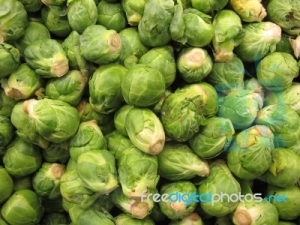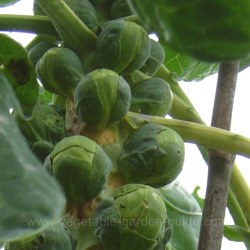
 Another vegetable in the limelight. It is called Brussel sprouts. It grows in bunches on the stem with the height of 2.5 feet tall. Its phyto-chemical properties encouraged the defense system of the body to protect it from harmful organism. Once it is controlled, the protection against many diseases are possible.
Another vegetable in the limelight. It is called Brussel sprouts. It grows in bunches on the stem with the height of 2.5 feet tall. Its phyto-chemical properties encouraged the defense system of the body to protect it from harmful organism. Once it is controlled, the protection against many diseases are possible.
This vegetables has sulforaphane, a powerful glucosinolate phyto-nutrients. It helps body’s detoxification enzymes in its ability to alter gene expression by cleaning the body of all carcinogenic substances. By reducing the damage to the DNA, there will be a reduced risk of cancer. At the same time, it boost the liver to produce enzymes that has the capacity to detoxify cancer-causing chemicals.
Brussel sprouts can assist the body to stop the spread of cancer cells to the internal organs especially in the early stage of its development.
A chemical called glucosinolates has the ability to prevent colon cancer from the exposure of heterocyclic amines, the carcinogenic compound, putting a stop or reduce the development of cancer cells in colon and liver. Brussel sprouts has an effective protective ability to control and eliminate.
Senigrin, a sulfur compound, activates once this vegetables are used, cut, chewed and digested in the body. If in contact with myrosinase enzyme, it releases a glucose including the compound called isothiocyanates, has strong potency to induce enzyme of the liver to detoxify carcinogen. Allyl isothiocyanates, another kind, prevent cell division (mitosis) and encourage programmed cell death (apoptosis).
All cruciferous vegetables including Brussel sprouts can lower incidence of very serious form of cancers (lung, colon, breast, bladder, ovary).
Bladder can be protected by isothiocyanates, a potent compound. An anti-oxidant chemicals can control free radicals to damage DNA, fat-containing molecules (cholesterol) and cell membranes. It encourage the gene to increase production of enzymes in order to get rid this free radicals.
This vegetables has excellent source of vitamin C. With vitamin C, it helps the immune system to carry out its function to the maximum efficiency. It produces collagen, a protein substance the body relied to its existence (skin, cartilage, tendon and connective tissues).
With vitamin C, the body can defend against infection. Vitamin A and C, make a supple and glowing skin. Brussel sprouts has fibers. Regular intake of fibers can fill up the stomach to ease the hunger. It nourishes the cell lining in the walls of the colon to become healthy. It controls diverticulitis. Good in the performance of the digestive system by having a soft bulky stool easily excreted out of the intestine.
It has enough supply of folic acid necessary for better division of cells. Woman with decrease amount of folic acid during her pregnancy may affect the nervous system of the fetus and cannot develop properly that may result to some form of birth defect.
Take Brussel sprouts. It can make wonder to make the body healthy.



